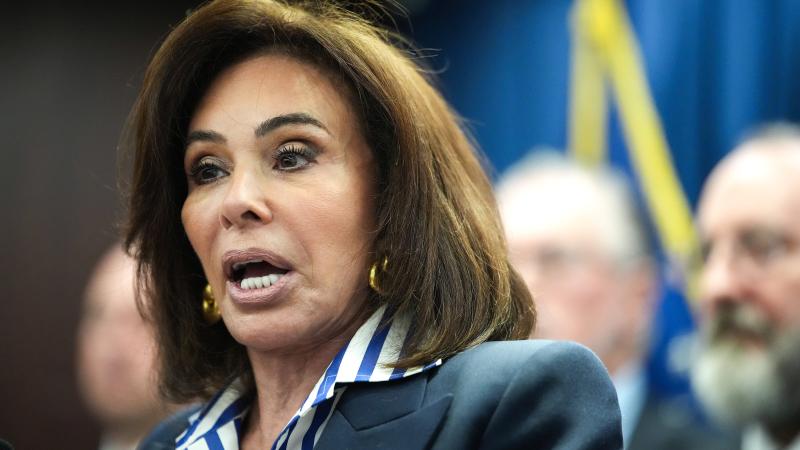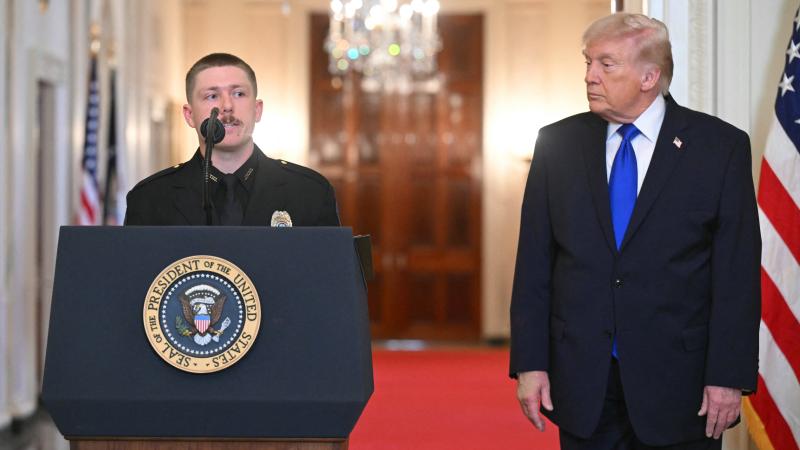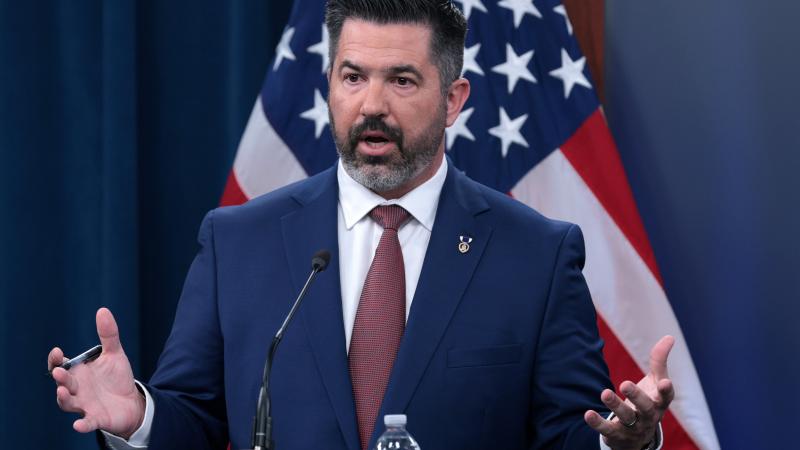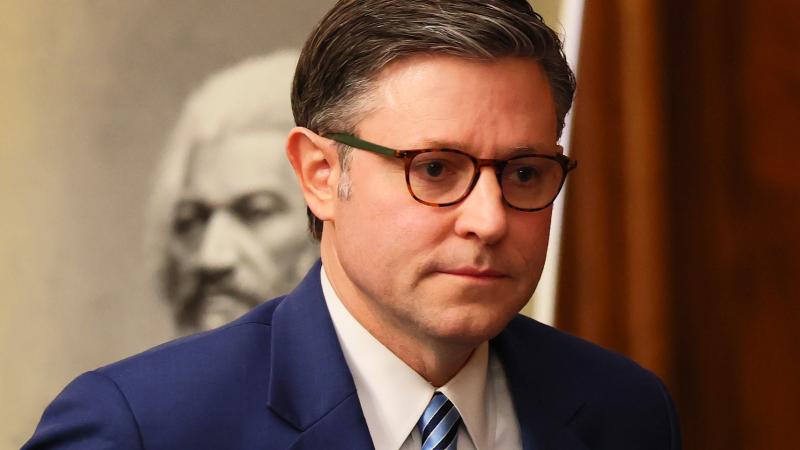Fear of crime is motivating factor behind 49 consecutive months of rising gun sales, experts say
Correlation and causation: Social upheaval and COVID lockdowns are most likely why gun sales are steadily rising, and some experts say, with no end in sight.
U.S. gun sales have topped one million for 49 consecutive months, according to newly released data that has Second Amendment advocates and gun violence prevention groups at odds over its meaning and causes.
Americans' aggregate purchase of firearms has modulated somewhat, with two slight but noticeable dips in 2009 and 2017, but have generally trended upward since then, according to Bureau of Alcohol, Tobacco, Firearms and Explosives data.
Reporting on the figures released last week, The Washington Examiner concluded the report was a forecast that this year would be "the third strongest year of gun sales, based on background check data from by the National Instant Criminal Background Check System, or NICS."
This comes at a time when the Biden administration is seeking more regulation on gun sales and states take divergent paths on firearm rules.
Just the News asked experts on both sides of the divide about the meaning of this trend. To be sure, historical and societal events play some role, even keeping in mind that correlation is not causation.
For example, from 2020 to 2022 — during the height of the pandemic — Americans frequently saw on their TV and internet news sites violence surrounding the "Black Lives Matter" protests. In that period, Americans bought “nearly 60 million guns” according to The Hill, analyzing data from The Trace, a non-profit newsroom "exclusively dedicated to reporting on our country’s gun violence crisis."
When asked his reaction about the continued record-breaking gun sales during an appearance on the "Just The News, No Noise" television show, Gun Owners of America Senior Vice President Erich Pratt told host John Solomon that the American people are saying “the Second Amendment is important to them.”
“They feel threatened, and the government is not protecting them,” Pratt continued. “They will protect themselves.”
His group considers itself the “no compromise” gun lobby, according to the organization’s website. It seeks to return gun rights that, in its view, have been lost under the current status quo.
The sense of fear in a tumultuous society pushing gun sales upward bears some scientific support. The centrist Pew Research Center's most recent public opinion polling from gun owners found that "72% of U.S. gun owners say protection is a major reason they own a gun."
The Pew report adds that concerns about personal protection "far outweigh" any other reason for owning a firearm, including use for hunting or sport shooting.
One of the lesser-known unintended consequences of the pandemic-era lockdown may have been an unusual spike in gun sales. According to an analysis by The Trace, the coronavirus pandemic was unlike any other, compared to sales after events such as mass shootings or highly-charged elections where increases in gun sales had been observed before.
Comparing firearms sales during the lockdown era and sales after highly publicized mass shootings is somewhat revealing: After the Sandy Hook shooting in late 2012 and the San Bernardino shooting in late 2015, sales topped out at about 2 million and 1.5 million, respectively. But those spikes in firearm sales was dwarfed by that in the opening months of the pandemic, which topped out at about 2.5 million guns at peak sales in June 2020 and has lasted longer than either of the post-mass shooting peaks.
“People are nervous that there’s a certain amount of civil disorder that might come if huge numbers of people are sick and a huge number of institutions are not operating normally,” Timothy Lytton, a Georgia State University law professor and gun expert, told The New York Times in 2020. “They may have an anxiety about protecting themselves if the organs of state are starting to erode.”
One expert noted that “It’s a totally different type of gun ownership now” John Roman, a senior fellow at the Economics, Justice and Society Group at NORC, a research group at the University of Chicago, told The Hill.
“It’s not a rifle stored away somewhere that you take out twice a year to go hunting," Roman said. "It’s a handgun, probably a semiautomatic handgun, that you keep in your bedside table or in your glove compartment, or that you maybe carry around with you.”
The summer of 2020 saw marked by civil unrest and demonstrations related to the "Black Lives Matter" movement in cities across the country, which saw gun sales peak that same month. The protests and riots erupted after George Floyd, a black male, died in police custody in Minneapolis after a white officer placed a knee on his neck for eight minutes.
Claims of police brutality and systemic racism, which protesters believe were the root causes of Floyd’s death, sparked the nationwide demonstrations. Data aggregated by The New York Times indicated that these were perhaps the largest demonstrations in U.S. history. Many of these demonstrations devolved into riots.
Dozens of people were killed or injured in the violent unrest, and thousands of businesses and properties, many minority-owned, were looted, torched, or otherwise vandalized. According to the Foundation for Economic Education, "property losses incurred during the George Floyd riots will come in at $1 billion to $2 billion."
Law enforcement and policymakers are asking why gun sales have not returned to pre-pandemic and pre-riot levels, and have only just begun to recede back to the level of sales found in late 2019.
One possible explanation is that levels of violent crime have remained high compared to pre-pandemic levels.
According to the Council on Criminal Justice, “There were 24% more homicides during the first half of 2023 than during the first half of 2019” in the cities it studied, and “Motor vehicle thefts more than doubled.”
While residential property crime has decreased and drug offenses have declined, this still marks an increase in the violent crimes Americans fear most.
Regardless of how one interprets the crime data, violent crime was a major issue for voters in last year’s midterm elections. About 60% of voters called the issue “very important when making their decision about who to vote for in [that] year’s congressional elections.”
At the very least, the perception of the violent crime problem has contributed to more Americans saying that they do not feel safe. According to Newsweek, a 2022 poll “of 2,000 nationally representative Americans analyzed how they feel about their personal safety and found that 52 percent are feeling on edge every day.”
Even gun violence prevention groups now acknowledge that Americans are purchasing guns at higher rates due to safety concerns and an interest in self-defense, but these groups express significant concerns about the effects of more widespread gun ownership.
“The vast majority of America’s gun owners cite self-defense as a major reason for purchasing a firearm, but they have been purposefully misled by the gun industry,” Kris Brown, president of Brady, an organization working to prevent gun violence, told Just The News.
“Much like the tobacco companies downplayed the risks of cigarettes to make money, the gun industry has downplayed the risks of firearms and overstated their benefits, all to make money." Brown said.
"The fact is, owning a gun does not make you and your family safer," she continued. "Access to a gun in the home increases the risk of suicide death by 300%. The states with the highest levels of gun ownership experience an unintentional firearm mortality rate that is seven times higher than in the states with the lowest levels of gun ownership, and right now eight kids a day are unintentionally killed or injured by family fire. So, contrary to the gun industry’s marketing, increased gun ownership only makes you more vulnerable than ever.”
Brown also said: “That being said, we know that many people will choose to arm themselves despite these risks and they should take actions to prevent tragedy, including safe storage. Studies show that locking all household firearms could reduce firearm suicide and unintentional firearm fatalities among youth by up to 32%. So, we beseech new gun owners to be responsible and make safe storage a priority.”
Last week, amidst elevated gun sales, the Biden administration proposed new ATF regulations that would change the way sellers of firearms are licensed to do so.
The new rule uses a provision of the 2022 Bipartisan Safer Communities Act which revised the definition of “engaged in the business” when it comes to selling firearms to include someone “who sells firearms to predominantly earn a profit.” The previous definition provided that the individual had to have “the principal objective of livelihood and profit.”
Under the administration’s new regulations, creating a website, maintaining records of profits and losses, and purchasing business insurance or renting space at a gun show, would be elements of a seller “engaged in business” with firearms.
According to the Associated Press, ATF estimates 24,500 to 328,000 sellers would be affected by the rule, requiring them to become licensed by the federal government for gun sales or be faced with five years in prison and a $250,000 fine.
This rule would also require thousands of gun sellers who meet the minimal definition to conduct federal background checks on their sales, adding previously off-the-books firearms purchases into the federal registry.
“An increasing number of individuals engaged in the business of selling firearms for profit have chosen not to register as federal firearms licensees, as required by law,” said ATF Director Steven Dettelbach in a statement released by the Justice Department. “Instead, they have sought to make money through the off-book, illicit sale of firearms."
State governments have also taken recent action on firearms, often implementing policies reflecting their differences in political posture. For example, Florida (a "red" state) passed a constitutional carry law this year, which allows residents to carry a concealed firearm without a special permit, license, or training. Reporting indicates that Florida has experienced an increase in gun sales since the new law came into effect, especially at gun shows, which the administration seeks to regulate.
By contrast, California (a "blue" state) recently passed new bills – AB1543 and AB1794 – targeting firearms sales, making it easier to sue firearm manufacturers, and regulating handgun manufacturing. AB1794, or the "Unsafe Handgun Act," is currently in danger of being struck down after a federal judge in San Diego enjoined the state from enforcing the measure. The State of California appealed and is waiting on a ruling from the Court of Appeals for the Ninth Circuit.
The Facts Inside Our Reporter's Notebook
Links
- U.S. gun sales have topped one million for 49 consecutive months
- according to
- The Trace
- on track
- organizationâs website
- public opinion polling
- since 2017
- an analysis
- an organization
- told The Hill
- told the New York Times
- an officer placed a knee on his neck
- indicated
- evolved into riots
- Council on Criminal Justice
- major issue for voters
- a 2022 poll
- family fire
- new regulations
- Bipartisan Safer Communities Act
- new regulations
- five years in prison
- a statement
- constitutional carry law
- indicates
- AB1543
- AB1794
- stopped the state
- currently waiting















